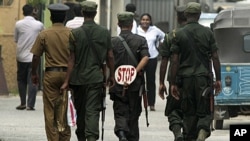In Sri Lanka, which has emerged out of a long drawn out armed separatist conflict, a state of emergency will be lifted after 28 years. But critics question whether ending wartime restrictions will improve the human rights situation in the island nation.
Sri Lankan President Mahinda Rajapakse's decision not to renew a state of emergency at the end of August comes two years after a three-decade civil war ended with the defeat of Tamil Tiger rebels.
Commentators say that scrapping the emergency has symbolic significance for a country where an entire generation has grown up with tough wartime regulations.
But several political pundits doubt whether the move will restore political and civil rights in a country where the human-rights record has been under international scrutiny.
The emergency orders gave authorities sweeping powers of arrest and detention.
Paikiasothy Saravanamuttu, at the Center for Policy Alternatives in Colombo, says the authorities will continue to retain power under an existing tough law, the Prevention of Terrorism Act. He says the government may also bring in legislation which could allow it to continue detention those who have been arrested under emergency provisions.
"It appears to be the case that the PTA will remain and there will be consequential legislation which will give it legal cover in terms of existing detentions… This needs to be looked at. Otherwise, it will be seen as window dressing without any substantive content," Saravanamuttu noted.
Exact numbers are not available, but thousands of ethnic Tamils are believed to have been detained during the emergency.
Critics also say that the scrapping of emergency law is meant to placate international opinion just weeks before the U.N. Human Rights Council discusses the rights situation in Sri Lanka. Human rights groups charge that tens of thousands of Tamil civilians disappeared in the last weeks of the war. Critics say the government continues to discriminate against the Tamil minority and stifles dissent. The government denies that.
Saravanamuttu says the government needs to do more to signal that it is addressing concerns about its human rights record.
"The government still has a lot of ground to cover to reverse the culture of impunity in respect of human rights, violations as well as dealing with the allegations of war crimes," added Saravanamuttu. "The kind of paradigm within which the government is operating at the present is one which sees human rights as largely as irrelevant to the higher objectives it claims to have."
But supporters of scrapping the law say that ending the emergency is a positive first step in restoring a sense of normalcy to a country that lived through three decades of conflict.
Jehan Perera at Colombo's National Peace Council hopes it will mean a diminishing role for the military.
"The lifting of the emergency would mean that the military would have to take a back seat," said Perera. "It would be out of the public spaces... especially in the north and east which are described as still being under military rule rather than under civilian administration. Now, hopefully, with the lifting of emergency, that system of military control will be abolished and the civilian administration will be more fully in control."
Several countries, including the United States and India have welcomed the announcement of an end to emergency restrictions in the island nation.
Sri Lanka to Lift State of Emergency










